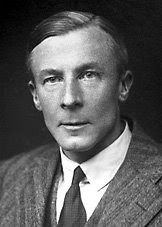Education
British neurologist and neurophysiologist, who established the ‘all-or-none’ character of the propagated nervous impulse earned him the Nobel Price for Physiology or Medicine in 1932. He was a pioneer in recording bioelectrical events in the nervous system. He received the OM in 1942 and was knighted baron of Cambridge in 1955.

Edgar Douglas Adrian was born on November 30 1889 in London to Alfred Douglas Adrian, a legal adviser to the British Local Government Board.
Adrian graduated in medicine from Trinity College, Cambridge, in 1915. After serving in the Royal Army Medical Corps during World War 1, he returned to Cambridge University, becoming professor of physiology (1937) until 1951 when he was elected master of Trinity College Cambridge (1951-65), and ultimately chancellor of the University (1968-75).
Adrian made the key discovery of nerve impulses, even though he only had access to primitive instruments.
Combining the amplifying apparatus pioneered by Herbert Gasser with a capillary electrometer, Adrian developed a sensitive and rapid means of detecting impulses.
In 1934 Adrian turned his attention to the electrical activity of the brain, recording and analyzing the various wave patterns and contributing greatly to the newly founded technique of electroencephalography. Adrian was president of the Royal Society (1950-55).
He wrote three books,
*The Basis of Sensation (1927)
*The Mechanism of Nervous (1932)
*Action Physical background of Perception (1947)
He died on August 4, 1977 and is buried at Trinity College.
Adrian, Edgar Douglas
- Biography Of John Desmond Bernal (1901 – 71)
John Desmond Bernal, British physicist. He was a pioneer of diffraction X-ray method. His interest of biology increased during the 1930s and the 1940s, probably in relation with the study of biological molecules (peptides, nucleic acid, etc) with this...
- History Of St. John College, Cambridge
St John’s College, Cambridge, founded in 1511 owed is existence to Bishop John Fisher and Lady Margaret Beaufort, is one of the largest colleges in the University and is home to one of Cambridge’s famous landmarks, the Bridge of Sighs. At the time...
- Short Biography Of Zuckerman, Solly, Baron (1904-1993)
Zuckerman was born in South Africa and received a degree in anatomy from the University of Cape Town in 1923. He carried with chacma baboons near Cape Town before moving to England in 1926. He studied medicine at University College London and qualified...
- Sir Edward Victor Appleton (1892-1965)
British physicist Sir Edward Victor Appleton on the Nobel Prize in physics in 1947. He discovered the layer of the ionosphere which reflects high frequency radio waves. Born in Bradford, he studied physics at Saint John’s College, University of Cambridge...
- Abdus Salam - Nobel Price Winner In Physics
Abdul Salam, Pakistani physicist and Nobel Laureate, known for his contributions to the understanding of the interactions of elementary particles. Abdul Salam was born in a small district, Jhang Sadar in Pakistan on Jan 29, 1926. He was educated at the...
Education
Adrian, Edgar Douglas
British neurologist and neurophysiologist, who established the ‘all-or-none’ character of the propagated nervous impulse earned him the Nobel Price for Physiology or Medicine in 1932. He was a pioneer in recording bioelectrical events in the nervous system. He received the OM in 1942 and was knighted baron of Cambridge in 1955.

Edgar Douglas Adrian was born on November 30 1889 in London to Alfred Douglas Adrian, a legal adviser to the British Local Government Board.
Adrian graduated in medicine from Trinity College, Cambridge, in 1915. After serving in the Royal Army Medical Corps during World War 1, he returned to Cambridge University, becoming professor of physiology (1937) until 1951 when he was elected master of Trinity College Cambridge (1951-65), and ultimately chancellor of the University (1968-75).
Adrian made the key discovery of nerve impulses, even though he only had access to primitive instruments.
Combining the amplifying apparatus pioneered by Herbert Gasser with a capillary electrometer, Adrian developed a sensitive and rapid means of detecting impulses.
In 1934 Adrian turned his attention to the electrical activity of the brain, recording and analyzing the various wave patterns and contributing greatly to the newly founded technique of electroencephalography. Adrian was president of the Royal Society (1950-55).
He wrote three books,
*The Basis of Sensation (1927)
*The Mechanism of Nervous (1932)
*Action Physical background of Perception (1947)
He died on August 4, 1977 and is buried at Trinity College.
Adrian, Edgar Douglas
| Cambridge University |
- Biography Of John Desmond Bernal (1901 – 71)
John Desmond Bernal, British physicist. He was a pioneer of diffraction X-ray method. His interest of biology increased during the 1930s and the 1940s, probably in relation with the study of biological molecules (peptides, nucleic acid, etc) with this...
- History Of St. John College, Cambridge
St John’s College, Cambridge, founded in 1511 owed is existence to Bishop John Fisher and Lady Margaret Beaufort, is one of the largest colleges in the University and is home to one of Cambridge’s famous landmarks, the Bridge of Sighs. At the time...
- Short Biography Of Zuckerman, Solly, Baron (1904-1993)
Zuckerman was born in South Africa and received a degree in anatomy from the University of Cape Town in 1923. He carried with chacma baboons near Cape Town before moving to England in 1926. He studied medicine at University College London and qualified...
- Sir Edward Victor Appleton (1892-1965)
British physicist Sir Edward Victor Appleton on the Nobel Prize in physics in 1947. He discovered the layer of the ionosphere which reflects high frequency radio waves. Born in Bradford, he studied physics at Saint John’s College, University of Cambridge...
- Abdus Salam - Nobel Price Winner In Physics
Abdul Salam, Pakistani physicist and Nobel Laureate, known for his contributions to the understanding of the interactions of elementary particles. Abdul Salam was born in a small district, Jhang Sadar in Pakistan on Jan 29, 1926. He was educated at the...
